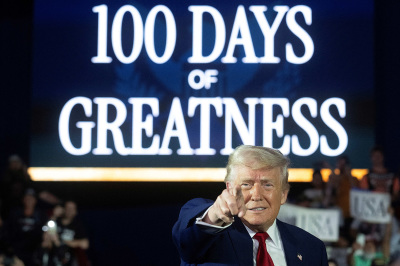
President Donald Trump is often hailed as funny. While campaigning, his speeches at rallies and appearances on podcasts and news programs often elicited peals of laughter from rallygoers and viewers.
During his first few press conferences upon returning to the White House earlier this year, even the reporters questioning him frequently found themselves chuckling or laughing. While the president does have a sharp wit and an amusing rhetorical style, much of what he says is not a “joke” in the traditional sense; rather, he just says what’s on his mind — and, incidentally, what’s on most others’ minds, too.
The reason this inspires laughter is because the past several years (anywhere from the past four years to the past few decades, depending on your sense of humor, where you fall on the political spectrum, etc.) have been increasingly restrictive in terms of what can be said, even jokingly. In the 1950s, Bugs Bunny slapping on lipstick and donning a dress and wig in order to fool Elmer Fudd was an obvious joke: by the end of the 2010s, such humor was labeled “transphobic” and would have come along with a Facebook or Twitter ban.
Given the regime of censorship and atmosphere of thought-policing prevalent over the last however-many-years, pervading even the world of comedy, it is a relief to hear someone else voice a “cancellable” thought that you yourself were thinking — it’s even more of a relief when the man so nonchalantly speaking his mind is the U.S. president.
However, the inverse of this principle is just as true. If hearing someone else simply state the unspeakable obvious or blithely give voice to the observations we ourselves have observed is enough to inspire laughter, then strictly adhering to the prescribed list of acceptable “jokes” is enough to wipe the smiles off most people’s faces. Take Stephen Colbert, for instance. For the last decade, the explicitly political “comedian” has hosted “The Late Show,” taking over from David Letterman in 2015. Last month, Colbert announced that the show would be canceled. Network executives say the decision was financially motivated, but the simple fact is that Colbert simply is not funny. Why? Because he pushes no boundary, offers no relief, and robotically follows his progressive-approved script to a “T.”
According to a 2020 study from the Center for Media and Public Affairs at George Mason University, a staggering 97% of Colbert’s election cycle jokes targeted, mocked, and denigrated Trump, while the mumbling, geriatric Democratic presidential nominee Joe Biden was essentially left unscathed. A Fox News review last month found that Colbert hosted leftist activists and progressive public figures as guests on his iteration of “The Late Show” in over 200 episodes and featured Democratic politicians as guests in over 170 episodes. A Republican appeared as a guest only once. Obviously, Colbert is an advocate for the Democratic Party (he ran a fundraiser for Biden’s disastrous 2024 campaign) and the progressive agenda, so it’s not much of a surprise that he would favor and promote Democrats and progressive policies on his show. What is, however, just as unsurprising — to everyone, it seems, except for Colbert and his team of writers and producers — is that no one finds that funny.
It isn’t that politics isn’t a funny subject. Well-known comedians like Shane Gillis, Dave Chappelle, Theo Von, Tony Hinchcliffe, Ricky Gervais, and Rob Schneider — in addition to up-and-comers like Leonarda Jonie, Ben Bankas, and James Donald Forbes McCann — often poke fun at politics and politicians with uproariously funny results. However, none of these figures simply adheres to a wokeified script or eschews (or obsessively focuses on) certain political subjects out of some partisan loyalty. In his 2023 Netflix stand-up special “Beautiful Dogs,” Gillis makes it clear that he is not a Republican — but warns the men in his audience that an intense interest in history is a sign of “early-onset Republicanism.” He then spends the latter third of his special impersonating Trump — flawlessly. In the lead-up to last year’s election, Gillis appeared as a guest on the insult-comedy show “Killy Tony” as Trump. Despite sharing that he is not a Republican, Gillis lost himself in the character and actually began arguing policy (sans jokes) with Adam Ray, the comedian portraying Biden.
Before his untimely death, the comedy legend Norm Macdonald addressed political humor in an interview with his sister-in-law, Canadian television presenter Joyce Napier. Asked about parodies of Trump on comedy shows like “Saturday Night Live,” Macdonald said that Alec Baldwin’s appearances as the president in orange face paint and a blonde wig just aren’t funny. “The problem with, if you do an impression of someone, you have to like that person, you know, because you’re playing the person and people like themselves, so you can’t play someone and have contempt for them at the same time,” the veteran comedian, himself a former “Saturday Night Live” performer, said. He continued, “It doesn’t work as an impression. So I don’t like his impression, and I have no political affiliation. I just mean from a comedy level.”
Whether Gillis is a Republican or not, it’s apparent that he follows Macdonald’s school of thought, rather than the Colbert method. Despite his support for progressive policies and politicians, Colbert’s comedy fails to land because there is no warmth in it, no joy in it, no love in it. (Yes, I know how that sounds, just bear with me a moment.) Dave Chappelle has faced numerous calls for his cancellation and ostracization from society over the years, on the basis of his frequent jokes targeting transgenderism. Yet it’s clear from his stand-up routines that Chappelle does not hate people who identify as transgender — he really loves the people themselves. Rather, he mocks and ridicules transgenderism — the idea that a man can, like Bugs Bunny, slap on some makeup and don a dress and wig and somehow become a woman — because it is ridiculous. There is no hatred for another person in Chappelle’s comedy. Even though he is a Democrat and proudly voted for Obama, Chappelle delivered a strong (and humorous) defense of Trump — who is more verboten in the eyes of mainstream censors and producers than the German dictator they often compare him to — during one of his “Saturday Night Live” monologues.
Former “The Tonight Show” host Jay Leno recently spoke on the subject of political humor, advising his fellow self-styled comedians — especially on the late-night circuit — not to make their humor too partisan. “I love political humor — don’t get me wrong. But people wind up cozying too much to one side or the other,” Leno said. “Why shoot for just half an audience? Why not try to get the whole? I like to bring people into the big picture. I don’t understand why you would alienate one particular group,” he continued. Leno added, “I don’t think anybody wants to hear a lecture.”
Progressive and unfunny John Oliver, host of the often-political “Last Week Tonight” on HBO, fired back, “Comedy can’t be for everyone. It’s inherently subjective.” He continued, “So, yeah, when you do stand-up, some people try to play to a broader audience, which is completely legitimate. Others decide not to, which is equally legitimate. I guess I don’t think it’s a question of what you should do because I don’t think comedy is prescriptive in that way. It’s just what people want.”
Except that nobody wants what Oliver — and Colbert and others, like Jimmy Kimmel and Jimmy Fallon — are selling. “Last Week Tonight” is a failure, attracting less than 250,000 viewers. (For context, even Colbert managed just over three million viewers over the summer — and his show was just canceled.) Meanwhile, the overtly-left-wing “Jimmy Kimmel Live” has lost nearly 600,000 viewers just since May. Fallon, at least, seems to know what time it is and just hosted Fox News’s late-night personality and pro-Trump figure Greg Gutfeld as a guest. For his part, Gutfeld has maintained anywhere from 2.8 to three million viewers over the course of the summer on his more right-wing version of a late-night talk show. The American public voted overwhelmingly against progressive extremism and Democratic toadying in November, returning to the White House a man who the mainstream media, Hollywood, and the political establishment spent nearly a decade constantly deriding and smearing as a reincarnation of Adolf Hitler. So there goes Oliver’s “It’s just what people want” theory.
Oliver’s bitterness and almost nihilistic approach to humor blinds him (and those like him) to the problem: his bitterness and almost nihilistic approach to humor. Gillis may not agree with Trump’s politics, but he clearly does not have Trump Derangement Syndrome, so his Trump jokes are enjoyable. Chappelle much more obviously and openly disagrees with Trump’s policies, but wishes him well as a man, so his Trump jokes are also funny. Ricky Gervais is known as a cynic, but his love for his country and his appreciation for (tangible, readily-observable) truths give his humor life. But Oliver, Colbert, Kimmel, “Saturday Night Live,” and the rest don’t like who or what they’re making jokes about. In fact, they don’t even really seem to like the progressive extremism that they supposedly support: they seem to embrace it more out of hatred for its antithesis than out of love for the ideology itself. Thus, their “jokes” not only aren’t funny, following as they do their progressive-prescribed political scripts, but come off as whiny, bitter, and nasty.
The fact is that giving voice to the thoughts of others when no one else is sure he wants to be the one to say it first is funny, it’s relieving, it’s worth a laugh. But imposing ideologies that next to nobody wants (transgender toddlers, anyone?) night after night after night is one of the quickest ways to not only smother laughter but lose an audience and alienate at least half the country. Add in a fairly heavy dose of contempt and spite, and the result isn’t even a failure to be funny but the very opposite of funny, made all the more repulsive by the “comedian’s” seemingly narcissistic insistence that he is, in fact, funny. That’s how humor dies. What really brings the laughs is enjoying your own joke and, sometimes, having the courage to say what everyone else has been thinking but has been told they can’t say.
A version of this piece appeared originally at The Washington Stand.
S.A. McCarthy serves as a news writer at The Washington Stand. He has also been published by The American Spectator, Real Clear Investigations, and Crisis Magazine. He graduated from McDaniel College in Westminster, Maryland, with a degree in English Literature and Communication.

















